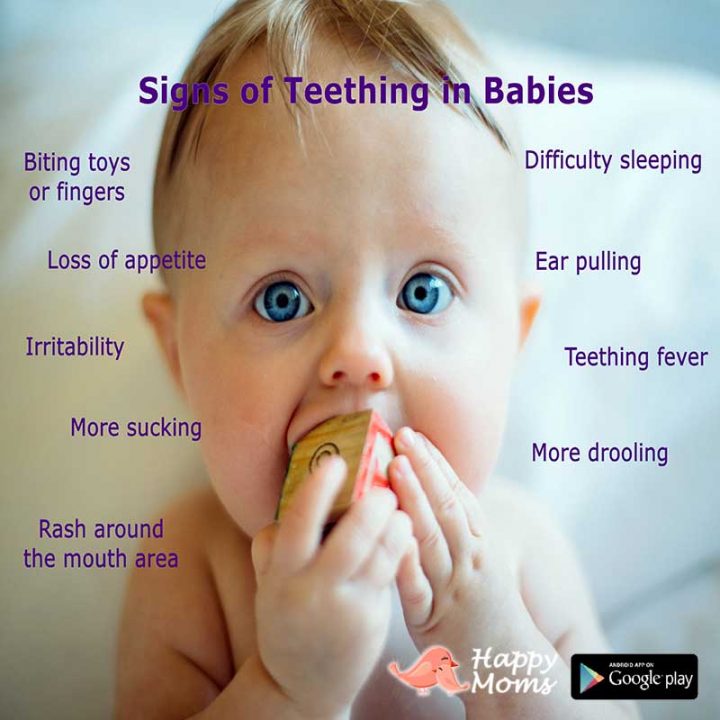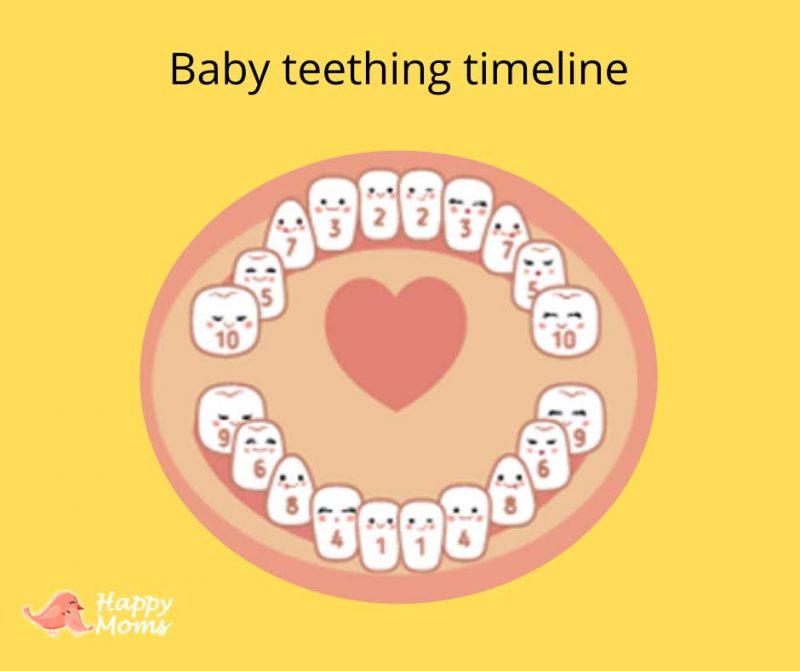
Teething is one of the most challenging times for a mother as well as for the baby. It does not end in a day or a week rather its an ongoing process. Most babies start to have teething from 6 months of age and erupt their second molar the last ones around 31 months or older.
Some babies may start to get teeth as early as in the first couple of months of life. Others may not see much happening until closer to the 1-year mark. And, sometimes they don’t follow the usual order. Signs of teething start to show up when your child becomes 4months old but some children show signs of irritability due to teething process as early as 2 and half months of age while some children show no symptom of teething at all.
Commons symptoms
- Fussiness & Irritability:A general irritable behavior is shown by the babies 3 to 4 days before the eruption of the tooth. They might be crankier than usual and demand more cuddling from you.
- More biting:If your baby is breastfed you will experience him biting your nipples during the feed and sometimes even the baby is not hungry just want to soothe his gums through biting your nipples or feeder teets and pacifier. They might try to bite everything near them.
- Loss of appetite:It is one of the most common symptoms when the baby is teething. He might even lose some weight during this process. The reason is his swollen gums, when he eats, his gums hurt. This makes the mothers most worried. You can try slightly chilled (if it’s summer) soft-textured food for your kid (especially their favorite one so that they can’t resist it despite the discomfort caused by eating). Liquid diets like shakes and juices might also be liked by your baby during this time. Read when to offer juices and other foods.
- Drooling:Increased drooling during teething is common, it might even cause a rash around the mouth and chin. Keep cleaning the area around the mouth with a soft clean cloth. Take care not to wipe too often though, as this can also irritate the skin. You can put petroleum jelly around the area so that the drool does not touch the skin directly.
As a result of excessive drooling, some babies may get diarrhea, which can in turn lead to diaper rash. If you notice loose stools (generally more than three loose stools in a day are not due to drooling), call/visit your doctor to discuss.It’s important to keep an eye on whether your baby has soiled the diaper again because loose stool can easily cause diaper rash that can cause discomfort to your baby.
- Sucking:You may notice that your baby is sucking almost everything around. This is a result of your baby trying to relieve the pressure from a tooth that’s about to come up from the gums. In Pakistan, there is this common myth that teething causes diarrhea but in reality, it does not. More drooling or putting everything in mouth and sucking causes diarrhea because no matter how much you clean, all surfaces have some sort of bacteria that can affect the intestine of your baby. You can sterilize the toys and teethers or you can just put them in boiled water, cover the lid for few minutes and later put them in the refrigerator. Give them to your baby (the chilled and sterilized teethers and toys will not only soothe the baby’s gums but also prevent them from having diarrhea).
- Trouble sleeping:It might be difficult for your baby to have a sound sleep during teething days because of the discomfort caused by sore gums. On the other hand, some parents have complained that their kids sleep more during teething.
- Ear pulling:Ear pulling is also one of the signs, as babies get irritated gums. Babies pull ears when pain in their gum’s travels to the eardrums and jaws
- Teething fever:Fever is not a sign of teething. A slightly raised body temperature is normal during teething though but if you notice your baby’s temperature measures above 101 F, it indicates infection.
Teething Timeline
Teeth come in over a period of months, and they often appear in this order: the bottom two middle teeth first, then the top two middle ones, then those along the sides and back

Tips to relieve the pain:
- Chilled Clove oil proved to be soothing for teething irritation, it has a natural numbing tendency, just put in a little bit on a clean finger of yours or a cotton ball and slightly touch the gum but always use anything in case of babies younger than age 1 after asking your pediatrician.
- Never use bio 21 tablets for early teething, they are highly discouraged by all the doctors.
- Vitamin D drops should be given until three years of age
- Age of 1 year as they might play a role in teething.
- Breastfed babies might bite while breastfeeding to relieve their pain and to soothe their gums. Putting chilled cabbage leaves might help the sore nipples and you can also use ointments containing Lanolin as a main ingredient to heal the nipples
- Press baby gums with your thumb or finger, a slight pressure, and help them soothe the pain.
- Teethers are the best help, make sure to use the ones safe for baby.
- Chilled wet cotton cloth can be given to babies to chew on to relieve gum pain, as it numbs the gums. For this wet, the soft clean washcloth or cotton cloth, place it in the freezer for a few minutes and then give it to your baby.
Treatments to Avoid:
- Remedies and homeopathic teething tablets:In Pakistan, several remedies including soothing gel and bio-21 tablets (teething-21) are frequently used to ease teething problems in babies. Dr. Muhammad Waqas Khawaja in his article “BiO-21 – A Cure Or Curse?” explained that “The active ingredients of Bio-21 include Calcarea Phosphorus (CalC Phos.) and Ferrous Phosphorium. Calc Phosphorus is a major component in most fertilizers, animal feed, glass manufacturing, and dental products, and has been advocated as a remedy for infant teething pain. This somewhat mythical quality has been proven to be incorrect.” Use of these tablets should be completely avoided
- Teething medications containing benzocaine or lidocaine: Avoid using medicines containing benzocaine or lidocaine, they are harmful for the babies
Taking Care of Baby’s New Teeth:
- Use a clean soft cloth to clean baby’s gum, after feeding and before sleeping, this keeps food particles and bacteria building up in baby’s mouth
- Soft- bristle toothbrush should be used to clean baby’s teeth twice a day.
- You can use fluoride toothpaste for kids once a child turns 2 or 3 years of age
Watch video on Teething Timeline:
Read more on Introducing solids
Watch our video on Healthy smoothies for kids
This article is for informational purposes only, and is not meant to offer medical advice.
Reviewed by Dr. Mamoona Ahmad (Dental surgeon)




